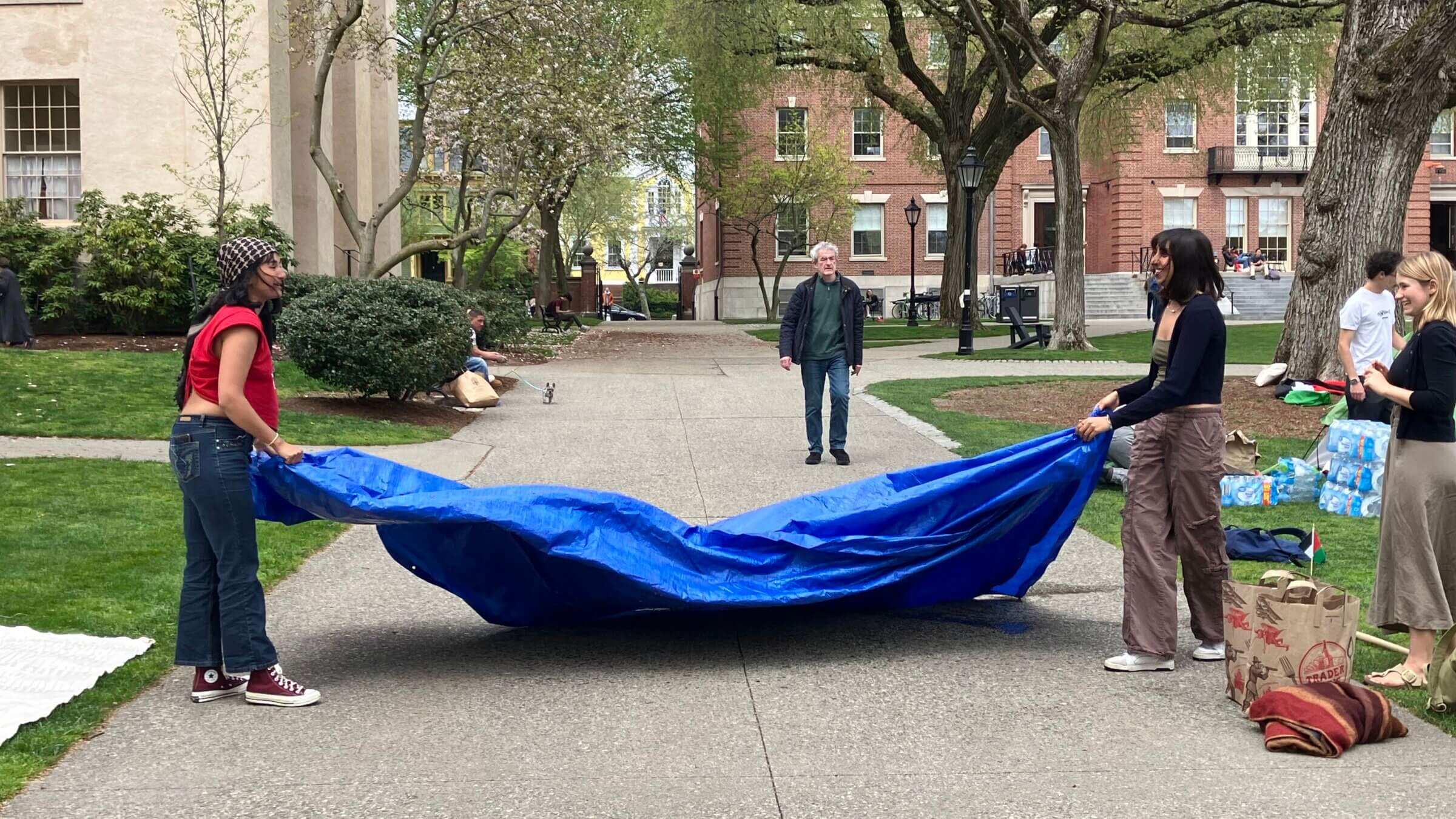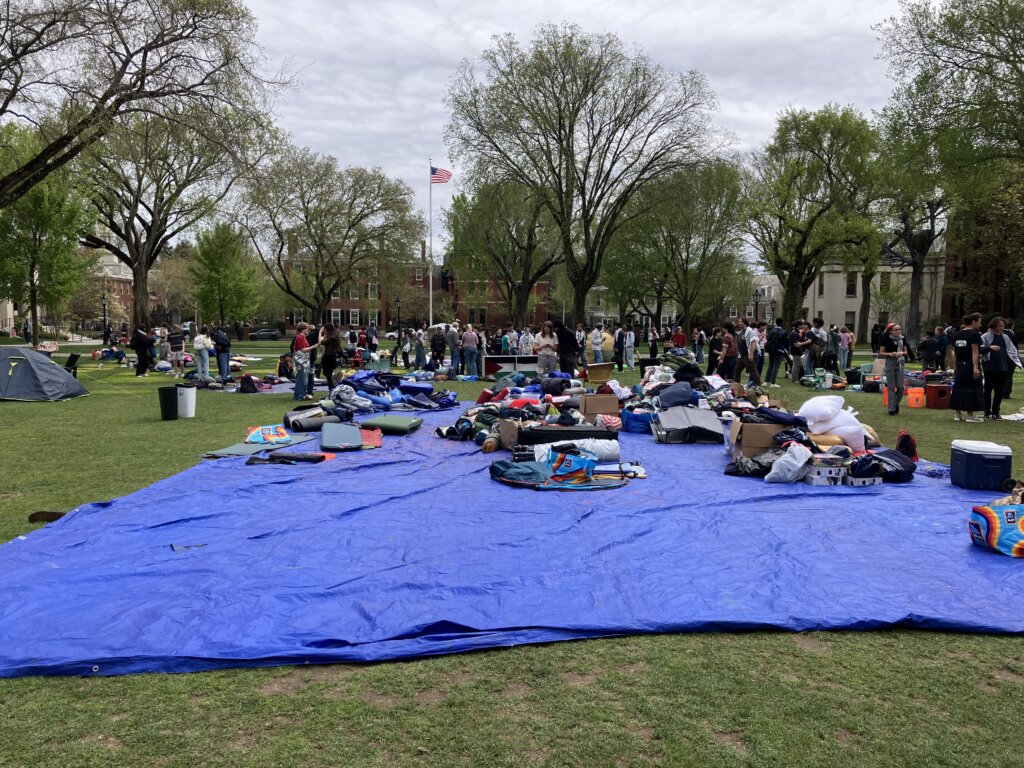‘Huge win’: Brown University protesters reach an agreement to dismantle encampment
Student protesters received several concessions from the university, including a promised vote on divestment

Students from Brown University’s encampment fold a tarp as they break their protest down, after reaching an agreement with the university administration. Photo by Mira Fox
Student protesters at Brown University agreed Tuesday afternoon to dismantle their encampment in exchange for concessions from administration, including the right to present their case for divestment from Israel at the next meeting of the board that oversees the university’s investments.
One student protester, addressing about 80 students who gathered for a rally to announce the agreement, called it a “huge win.”
Students in the encampment were jubilant, hugging each other as they broke down their tents — a stark contrast with the mood at Columbia University. There, protesters occupied a campus building early Tuesday morning, a day after the university began suspending students who vowed not to leave their encampment until the school divested from Israel and closed its outpost in Tel Aviv. About 1,000 students at campuses across the nation have been arrested in recent days for protests related to Israel’s military campaign in Gaza.

Brown students failed to win a second concession from the administration, that charges be dropped against the 41 students arrested in sit-ins for divestment last fall; the university has already dropped charges against 20 Jewish students arrested in an earlier sit-in for divestment.
The encampment’s leadership allowed those arrested in the fall to vote on whether to accept the agreement. Eiden Spilker, a senior who was arrested in one of the sit-ins, said that they ultimately decided that the larger cause of divestment was more important than their individual cases.
Two representatives from the university administration negotiated with students for several hours Monday and Tuesday before agreeing to allow them to make their divestment case to the Corporation of Brown University, and to have the Corporation vote on divestment in their next meeting, in October. It will mark the first time in Brown’s history that the university Corporation will hear and vote on a resolution to divest from Israel.
The leaders of the Brown Divestment Coalition, one of the groups that organized the encampment, also agreed not to hold any more unauthorized protests through commencement, May 24-26.
Inside Brown’s negotiations
In an initial offer sent by email Monday morning, Paxson offered to let a group of five students present the case for divestment to a small subset of the Corporation.
Students negotiated for more — that they would not just present their case at the May meeting, but that the Corporation would vote on it in October. Additionally, students will be allowed to present a previous report making the case for divestment from “companies that facilitate the Israeli occupation of Palestinian territory.” The report was published in 2020 by the university’s Advisory Committee on Corporate Responsibility in Investment Policies — a board that oversaw ethical guidelines for the university’s endowment from 1978 until 2020, when it was dissolved and replaced with a different advisory board.

“This doesn’t ensure a yes vote,” the speaker at a 1 p.m. rally reminded other protesters. She urged students to be ready to lobby faculty, staff and fellow students to put pressure on the Corporation to divest.
In 2021, Paxson declined to pass a revised version of the ACCRIP report on to the Corporation, saying in an email that “the recommendation did not adequately address the requirements for rigorous analysis and research as laid out in ACCRIP’s charge, nor was there the requisite level of specificity.”
“Brown’s endowment should not be used as an instrument to take sides on contested geopolitical issues over which thoughtful and intelligent members of the Brown community vehemently disagree,” she added.
Brown has a long history of divesting its endowment based on political and moral concerns. The university has divested from South Africa during the movement to abolish apartheid there, from companies doing business in Sudan due to “genocidal actions” in Darfur, and from tobacco companies in the past.
Paxson’s agreement to allow students to present to the Corporation follows a vote on Thursday by the Brown University Community Council, which advises the university president, to both allow students to address the Corporation’s May meeting and to drop charges against the arrested students.
Though the university will still be taking disciplinary action against students involved in the encampment, administrators have signaled that they will not escalate the punishment to suspension.
“They’re just really scared about commencement,” one student was overheard saying of the agreement. According to the agreement, the encampment must be cleared by 5 p.m. today, leaving the green open for graduation preparations.















